Politics
Syrians leaving Türkiye eager to grow their homeland
Syrians bidding farewell to Türkiye are eager to rebuild their homeland following the toppling of the Assad regime in December.
With the school year coming to a close, voluntary returns from Türkiye to Syria have accelerated and border gates in southern cities have been inundated with Syrian refugees excited to rebuild their country.
“Everything was wonderful in Türkiye with my children,” Emine Jourek Haji said as she waited to cross the Öncüpınar border in the southern Kilis province. “On the other hand, it was difficult because it’s not easy to live in a different country with four children but the 11 years have been wonderful. I thank Türkiye very much.”
For high-schooler Zeynep Kassap who has lived in Türkiye for eight years, leaving was a bittersweet experience.
“I have made unforgettable memories here. I have Turkish friends and I love them very much. I am sad to leave but I am happy to return to my country,” Kassap said.
Kassap and her family will go to Aleppo where she will continue her education. “I would like to thank Türkiye for providing us with the opportunity to stay here,” she said.
Mahmut Matra Karfa came to Türkiye 14 years ago when the civil war broke out and he was 4 years old.
“I studied, worked and experienced everything here,” Karfa said. “I get along well with my Turkish friends. It is difficult to leave but I will get used to it. Maybe I will visit again in the future.”
“Everyone ends up in their homeland, no matter where you stay, you eventually go back,” he added.
Calling out to fellow Syrians, Karfa said now was the time to go back.
“All Syrians need to return. Enough is enough. Assad is gone,” he said. “Let’s all grow our homeland again.”
Turkish authorities earlier this month said more than 273,000 Syrian refugees left Türkiye for their homes after the collapse of the Assad regime last December. Overall, more than 1.1 million Syrians have departed since 2016.
Türkiye has been home to millions from its southern neighbor as the Assad regime escalated attacks on the opposition and the country’s civil war dragged on. At one point, it was home to the largest Syrian refugee community in the world.
The country’s border crossings with Syria teemed with refugees within days of the fall of Damascus, the last bastion of Baathist resistance, with families rushing to return home after years of civil war. Ankara mobilized its border crossings when Syrians spontaneously streamed toward the border, which had been occasionally shut during the civil war, and streamlined the procedures for returnees.
Syria’s civil war killed over half a million people and left the country in desperate need of reconstruction. Western sanctions imposed on Assad were recently lifted, paving the way for a potential recovery.
Nearly 2 million Syrians have been able to return home from abroad or from displacement within the war-ravaged country.
A report from the UNHCR, the U.N. refugee agency, said the first months of this year saw rising numbers of Syrians returning home.
As of mid-May, more than 500,000 Syrians are estimated to have crossed back into the country since the fall of Assad, while an estimated 1.2 million internally displaced people (IDPs) have returned to their areas of origin since the end of November.
The UNHCR estimates that up to 1.5 million Syrians from abroad and 2 million IDPs may return by the end of 2025. The UNHCR report says that Türkiye follows Iran with the highest number of refugees, at 2.9 million people.
Politics
Türkiye won’t let terrorism drag Syria back to instability: Erdoğan
President Recep Tayyip Erdoğan on Monday said Türkiye will not allow terrorists to drag Syria back into chaos and instability following a suicide attack that killed 22 people at a church in Damascus.
“We will never allow our neighbor and brother Syria … to be dragged into a new environment of instability through proxy terrorist organizations,” he said.
Erdoğan extended condolences to the families of those killed, the Syrian government and the people of Syria.
“I wish a speedy recovery to the injured,” he added.
Erdoğan also stressed that the attack was aimed at destabilizing the peace, security and coexistence in Syria and the broader region.
“In the face of this vile terrorist act targeting Syria’s peace, internal stability and culture of living together, we stand with the Syrian people and government,” he emphasized.
“Türkiye will continue to support the Syrian government’s fight against terrorism,” he said.
A suicide bomber from the Daesh terror group opened fire Sunday inside the church in the east of Damascus before blowing himself up, killing at least 20 people and injuring 52 others, said the Syrian Health Ministry.
Agence France-Presse (AFP) correspondents saw first responders transporting people from the Orthodox church as security forces cordoned off the area.
The church itself was strewn with wood from fittings and pews, with fallen icons and pools of blood on the floor.
“A suicide attacker affiliated with the Daesh (IS) terrorist group entered the Saint Elias church in the Dwelaa area… opened fire, then blew himself up with an explosive belt,” an Interior Ministry statement said.
It cast the attack as a bid to “undermine national coexistence and to destabilise the country”, which only began emerging from the post-civil war chaos after Assad’s ouster six months ago.
The international community condemned the attack, the first of its kind in the Syrian capital since December.
The blast sparked panic and fear in the church, which had been full of worshippers, including children and the elderly, eyewitnesses said. Families were still searching desperately for missing loved ones.
The Syrian Observatory for Human Rights said it was the first suicide attack inside a church in Syria since war erupted in 2011. Other churches had been damaged or seen attacks in their vicinity during the conflict, but none had been so directly targeted.
The incident also comes just weeks after Syria’s Interior Ministry announced the uncovering of Daesh cells in rural Damascus on May 26. During the raid, authorities said they seized light- and medium-sized weapons.
Since the fall of the Assad regime, Syria’s security services have continued to pursue individuals accused of involvement in crimes, human rights violations and terrorism-related activities.
Interior Minister Anas Khattab said that specialized teams had begun investigating the church attack.
“These terrorist acts will not stop the efforts of the Syrian state in achieving civil peace,” Khattab said, according to a statement.
In an interview earlier this month, Khattab said that Daesh had shifted “to studied attacks on strategic targets” and had attempted “to carry out attacks against the Christian and Shiite community” that the authorities had thwarted.
Authorities said they had arrested members of a Daesh cell near Damascus, accusing them of preparing attacks.
Daesh seized large swathes of Syrian and Iraqi territory in the early years of the civil war, declaring a cross-border “caliphate” in 2014 before being territorially defeated in 2019.
Bashar Assad, Syria’s leader for nearly 25 years, fled to Russia in December, ending the Baath Party’s regime, which had been in power since 1963.
Ahmed al-Sharaa, who led anti-regime forces to oust Assad, was declared president for a transitional period in January.
Ankara, which has cordial ties with the new government, has repeatedly offered Damascus its operational and military to fight Daesh and other terrorist threats.
Politics
EU ambassador says ‘shameful’ to demand visas from Turks
Mandating visas from Turkish citizens is unacceptable and shameful, according to the head of the European Union delegation to Türkiye.
“Citizens of Colombia, which has a drug problem, or Georgia, which has troubled ties with the EU and even Venezuela, can travel to the EU without a visa,” said Ambassador Hans Ossowski in an interview with Turkish journalists in Brussels on Monday.
“In Türkiye, people wait for months, sometimes a year, to find a visa appointment,” he said.
“We must restart the visa liberalization process,” Ossowski said, adding, “We have made an honest offer to the Turkish government.”
Türkiye has been a candidate for EU membership for over two decades, but talks stalled in 2016 over what Ankara says is the bloc’s “insistence on politicizing the issue.”
Türkiye suggests it has fulfilled most of the criteria for membership. Though the accession process stalled, the country has remained a key economic and defense partner for the 27-member bloc.
“Türkiye has fulfilled 66 out of 74 criteria,” Ossowski echoed. “Let’s work on the remaining six criteria.”
The European Commission’s enlargement and Türkiye reports for 2024 marked Ankara’s progress in certain areas of its membership criteria and key developments in bilateral ties.
Foreign Minister Hakan Fidan was invited to the Gymnich meeting after five years, earlier this year, which conveyed to Brussels Ankara’s determination on membership and capabilities for cooperation with the EU on foreign policy, security, and defense.
Turkish officials say EU membership is strategic for Türkiye, which expects the EU to lift restrictions, revive high-level dialogue, update the customs union and facilitate the visa process until full visa liberalization.
However, the rejection rates for Turkish applicants have steadily increased since 2014, when the average rejection rate for Türkiye was 4.4%. By 2021, the rejection rate reached 16.9% during the pandemic, higher than the global average of 13.4%. In 2022, the rejection rate for Turkish applicants was 15.7%, compared to 17.9% globally.
In 2023, the number of Turkish citizens applying for Schengen visas reached over 1 million, with more than 48,000 applications being rejected. In 2024, denials stood at 14.5%, indicating a limited but measurable improvement.
Ankara believes the rejections are due to a shortage of staff in European consulates and the rising political tensions toward immigrants in Western countries, particularly in light of growing concerns about migration issues in the EU.
Despite the challenges, Foreign Minister Hakan Fidan has said that the visa issue is part of a broader political and diplomatic situation between Türkiye and EU member states.
“This is not just an issue between Türkiye and the EU. It’s a broader trend seen globally, and we are investigating if this is a case of special treatment toward us or just part of the general policy toward all countries,” Fidan said last November.
The call for visa liberalization and customs union updates remains central to Türkiye’s foreign policy objectives. The government hopes that through continued diplomatic engagement, it will be able to secure better conditions for its citizens who wish to travel, study and work in Europe.
Despite the lack of recent progress on visa liberalization and customs union agreement, the EU and Türkiye have maintained their strategic partnership, particularly in trade, security and defense.
Türkiye’s customs union with the EU, which came into force in 1995, is the only agreement between the EU and a non-member country. However, it is currently limited to industrial goods and processed agricultural products.
The customs union has significantly boosted trade between the two sides, raising the bilateral trade volume from $30 billion in 1995 to nearly $200 billion in 2022. However, Türkiye has pushed for an updated agreement that includes services, agricultural goods and public procurement.
The Turkish government is also eager to improve its relations with the EU in light of the broader geopolitical challenges in the region.
Politics
Turkish govt ally slams US as ‘architect of atrocity’ after Iran attack
Devlet Bahçeli, head of the Nationalist Movement Party (MHP) and ally to President Recep Tayyip Erdoğan, has slammed the United States as the “architect of atrocity” after the U.S. inserted itself into Israel’s war by attacking Iran’s nuclear sites.
“The United States is the bully and architect of atrocity that tramples over global conscience, stokes calamity, silently watches genocide unfold and threatens the Muslim world with weapons every time,” Bahçeli said in a statement released on Monday.
He accused U.S. President Donald Trump, who campaigned with the promise of ending wars, of being “contradictory and politically inconsistent, as well as fraudulent and insincere.”
“It’s the American people who can make the fairest and righteous intervention against this unreliable, faulty political attitude,” Bahçeli said.
“Israeli Prime Minister’s (Benjamin Netanyahu) statement that they launched an attack with the aim of ‘ending Iran’s nuclear appetite’ is nothing more than the mental eclipse of this era’s genocidal leader and the cunningness of producing a justification to defend the wrong while floundering in contradiction,” he added.
Iran’s neighbor, Türkiye, has condemned unprecedented U.S. strikes on Iranian soil, warning against the risk of escalating the conflict and destabilizing the entire Middle East. It also called on all parties involved to “act responsibly, mutually cease attacks immediately and avoid steps that could lead to further loss of life and destruction.”
It said only diplomatic negotiations could resolve the dispute over Iran’s nuclear program and urged the international community to support efforts for a diplomatic solution.
Although it is not party to the dispute between Iran and world powers over Tehran’s nuclear program, nor to the Iranian-Israeli conflict that continues after U.S. strikes, Türkiye has a lot at stake as a regional power and a neighbor of Iran. Unlike its allies in the West, it has defended Iran’s right to self-defense and slammed Israel’s policy of expansionism that now has its sights on Iran.
Turkish leaders have repeatedly warned that Israel’s next target may be Türkiye if its regional aggression is not stopped. Indeed, Israel views Türkiye as an opponent and occasionally issues veiled threats to Turkish leadership for its unwavering support to Palestinians suffering under the Israeli attacks since 2023.
Türkiye also maintains close ties with its NATO ally, the United States.
Justice and Development Party (AK Party) spokesperson Ömer Çelik said in a social media post on Sunday that worst-case scenarios can be triggered if conflicts spread across the region. “The danger of expansion of conflicts in our region emerged after U.S. attacks on Iran’s nuclear facilities,” he warned.
Politics
Erdoğan says Türkiye working to prevent ‘greater’ attacks against Iran
Türkiye is making intense efforts to prevent attacks by Israel or its supporters against Iran from turning into a “greater disaster,” President Recep Tayyip Erdoğan said Monday.
Speaking at an event marking the anniversary of the foundation of the Memur-Sen civil servants trade union in Ankara, Erdoğan blasted Israel’s war against Iran, now in its 11th day.
“Türkiye never condones attacks against Iran’s sovereignty or security of the region, no matter who they come from and we clearly express our reaction,” Erdoğan said.
The U.S. military bombed three Iranian nuclear sites in Fordo, Natanz and Isfahan on Sunday, amid rising concerns over an Iranian military response to the strikes.
The U.S. attacks were the latest escalation in a U.S.-backed Israeli military assault on Iran since June 13.
In a meeting with Iran’s top diplomat in Istanbul on Saturday, Erdoğan called for technical and leadership-level talks between Iran and the United States to resolve the tensions.
The U.S. attack has stoked concerns for a wider regional conflict and drawn international outcry.
Erdoğan told Iranian Foreign Minister Abbas Araghchi that Türkiye was ready to take on the role of facilitator.
He said the region cannot tolerate another war and said Israel must be “stopped immediately.”
Since the start of the Israeli-Iranian conflict, Erdoğan has been scrambling to end the hostilities. He has held a flurry of phone calls with leaders, including U.S. President Donald Trump and Iranian President Masoud Pezeshkian, offering to act as a facilitator for the resumption of negotiations on Iran’s nuclear program.
Israel on Monday said the Israeli army launched a new wave of airstrikes on targets in Tehran, including a prison in the city’s northwest region. The Times of Israel news outlet said that the prison was targeted to facilitate the escape of prisoners.
The new attacks came shortly after Iran fired a salvo of missiles into central and northern Israel on Monday as the conflict continued to widen between the two regional arch-foes.
Israel and Iran have been engaged in aerial combat since June 13, when Tel Aviv launched a surprise attack on several sites across Iran, including military and nuclear facilities, prompting Tehran to launch retaliatory strikes.
Israeli authorities said at least 25 people have been killed and hundreds injured since then in Iranian missile attacks.
Meanwhile, in Iran, at least 430 people have been killed and more than 3,500 wounded in the Israeli assault, according to the Iranian Health Ministry.
Tension with Israel
Erdoğan on Monday also assured his government was taking very necessary measures to keep 86 million Turks safe.
Last week, he announced Türkiye was planning to step up its production of medium- and long-range missiles.
Türkiye has tense relations with Israel, but analysts or officials don’t see an immediate threat of the conflict spreading into NATO-member Türkiye.
Türkiye has strongly criticized Israel’s actions, saying Iran has the legitimate right to defend itself against Israel’s attacks, which came as nuclear negotiations were ongoing.
Once close to rapprochement, Türkiye and Israel have grown deeply estranged, especially after the start of the war in Gaza in 2023, with Erdoğan becoming one of Israeli Prime Minister Benjamin Netanyahu’s fiercest critics.
Relations further deteriorated following the fall of Syrian dictator Bashar Assad’s regime, as Israel grew increasingly hostile to Turkish influence in Syria.
Earlier this year, Türkiye and Israel, however, established a “de-escalation mechanism” aimed at preventing conflict between their troops in Syria.
Politics
Muslim countries urge global action against Israel in Istanbul Declaration
In a declaration issued after a ministerial meeting in Istanbul on Sunday, the Organisation of Islamic Cooperation (OIC) strongly condemned Israel’s recent attacks on Iran, Syria and Lebanon, and called on the international community to take immediate deterrent measures.
The statement, released after the 51st session of the OIC Council of Foreign Ministers in Istanbul, described Israel’s actions as violations of international law and breaches of the sovereignty and security of the targeted countries.
The declaration “calls on the international community to take deterrent measures to stop this aggression and make Israel accountable for crimes committed.”
The declaration also announced the formation of an open-ended “Ministerial Contact Group,” which will be tasked with establishing regular contacts with the relevant regional and international parties to support de-escalation efforts, stop the aggression against Iran and achieve a peaceful settlement.
It stressed the urgent need to stop Israeli attacks while also expressing serious concern about the dangerous escalation, which threatens the region’s human, economic and environmental situation.
‘Productive’ talks
According to Foreign Minister Hakan Fidan, the meeting provided a venue for productive consultations amid increasing regional challenges.
“I extend my sincere thanks to my esteemed counterparts and all participants,” Fidan said in a statement posted on X late Sunday.
“At a time when our region is going through serious challenges, we, as Muslim countries, engaged in intensive and fruitful consultations,” Fidan added.
Fidan stated that the Istanbul Declaration amplified the collective voice of the Islamic world on global issues and included 156 resolutions addressing the common concerns of Muslim countries and minorities.
“Over the past two days, our main agenda item has been Israel’s aggressive stance, which poses a threat to regional security and stability,” he said.
Fidan also announced that the OIC has agreed to establish a contact group to address the recent developments in Iran.
He recalled the organization’s founding in 1969 in response to the arson attack on the Al-Aqsa Mosque, emphasizing that it remains committed to ending oppression and defending the rights of the Palestinian people.
“We will not allow Israel’s strategy of spreading the conflict across the region to overshadow the genocide taking place in Palestine,” he said.
Fidan underlined the importance of unity among Muslim nations, saying despite differences in language, “our prayers are the same,” and called for solidarity and cooperation to resolve shared problems.
Politics
OIC summit in Istanbul brings out diplomacy in ring of fire
The 51st session of the Council of Foreign Ministers of the Organisation of Islamic Cooperation (OIC) was held in Istanbul on Saturday and Sunday. The two-day event, held under the theme of “The OIC In A Transforming World,” was a display of unity for the world’s largest Muslim organization as Türkiye took over the rotating chairpersonship of the Council of Foreign Ministers.
The pressing issues the Muslim world is facing were naturally on the agenda of the meeting that continued amid Israel’s attacks on Iran and Iran’s response. Iranian Foreign Minister Abbas Araghchi was among the diplomats closely watched by journalists covering the event, while diplomats’ focus was also on the humanitarian crisis unfolding in Gaza, something Türkiye repeatedly called on the world not to forget amid escalating tensions between Iran and Israel.
Iran requested a special session at the summit. The closed-to-press session late Saturday focused on Israeli attacks on the country, media outlets reported. Similarly, ministers of OIC member states that are also members of the Arab League held a one-hour meeting on the sidelines of the summit to discuss developments in the Iran-Israel conflict.
Araghchi was later received by President Recep Tayyip Erdoğan on the sidelines of the summit. At the meeting, Erdoğan expressed that Israel “must be stopped immediately” and said the dispute over Iran’s nuclear programme must be resolved at the negotiating table, according to a statement by the Turkish Presidency. Türkiye is ready to play its part, for example, by facilitating dialogue, the president said. He told Araghchi that immediate steps should be taken to resume diplomacy between Iran and the United States, and that Türkiye would continue to support this process. At the OIC meeting, Erdoğan previously accused the Israeli government of being the “primary obstacle to regional peace” and stressed that Iran had a legitimate right to self-defense.
More than half of the OIC member countries are located in the Middle East or in its close vicinity, standing to be affected by ongoing conflicts directly.
Foreign Minister Hakan Fidan on Saturday accused Israel of leading the Middle East toward “total disaster” by attacking Iran on June 13.
“Israel is now leading the region to the brink of total disaster by attacking Iran, our neighbor,” Fidan told the summit. “There is no Palestinian, Lebanese, Syrian, Yemeni or Iranian problem, but there is clearly an Israeli problem,” he said. He called for an end to the “unlimited aggression” against Iran. “We must prevent the situation from deteriorating into a spiral of violence that would further jeopardize regional and global security,” he added.
The OIC, founded in 1969, says its mission is to “safeguard and protect the interests of the Muslim world in the spirit of promoting international peace and harmony.”
The summit brought together top diplomats from nearly 50 Muslim-majority countries amid mounting global concern over Israel’s military operations in Gaza and what leaders described as a failure by the international community to protect Palestinian civilians.
President Recep Tayyip Erdoğan addressed the summit on its opening day, emphasizing the need for Muslim nations to stand united against what he called “barbaric and inhumane” attacks on Palestinians. “The Islamic world must raise its voice louder against injustice,” Erdoğan said. “We can no longer tolerate double standards in international politics.”
OIC Secretary-General Hissein Brahim Taha echoed calls for international accountability and said the organization stands firmly behind the Palestinian people’s right to self-determination. “What we are witnessing in Gaza is not just a political issue; it is a human tragedy that requires urgent action,” Taha said.
In addition to the Gaza conflict, ministers addressed growing anti-Muslim sentiment in the West, particularly in Europe and North America. The summit also touched on economic cooperation, climate change, and regional stability. Delegates reaffirmed the OIC’s commitment to sustainable development and voiced support for conflict resolution efforts in Sudan, Yemen, and Afghanistan.
Ministers, including Fidan, held bilateral talks on the margins of the summit. The summit also hosted representatives of other international bodies and agencies, including Miguel Angel Moratinos, high representative of the U.N. Alliance of Civilizations, as well as Philippe Lazzarini, commissioner-general of the United Nations Relief and Works Agency for Palestine Refugees in the Near East (UNRWA). Overall, some 1,000 people attended the event.
Türkiye is among the founding members of the OIC and hosts eight subsidiaries of the organization. Since 1976, it has hosted three Council of Foreign Ministers meetings. The country was also the first to open a permanent OIC representation office in Saudi Arabia’s Jeddah in 2015, and one year later, it hosted a heads of state summit.
-
Daily Agenda2 days ago
Fatih Altaylı statement from DMM: A campaign is being carried out to manipulate the public.
-

 Daily Agenda2 days ago
Daily Agenda2 days agoLast call for those who do not renew their driver’s license! They will be considered without driving license from 31 July
-
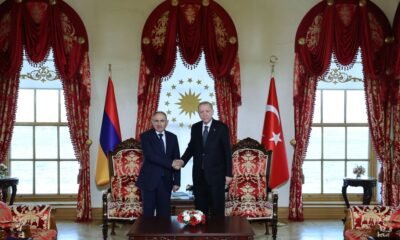
 Politics2 days ago
Politics2 days agoErdoğan, Pashinyan discuss Türkiye-Armenia peace efforts, developments
-
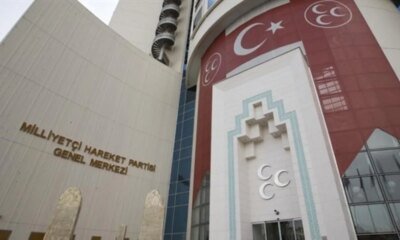
 Daily Agenda3 days ago
Daily Agenda3 days agoMHP, ‘National and Unity and Solidarity Meetings for Türkiye without terrorism
-
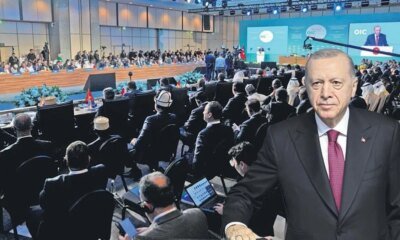
 Daily Agenda3 days ago
Daily Agenda3 days agoHistorical Call from President Erdoğan to the Islamic World: Our neck debt to clamp against Israel
-

 Daily Agenda2 days ago
Daily Agenda2 days agoPunishment on the wife who watched his wife’s messages
-
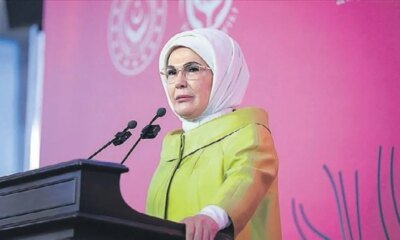
 Daily Agenda2 days ago
Daily Agenda2 days ago‘Women are the key to the fair world’ – Breaking news
-
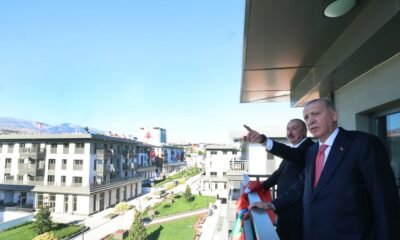
 Politics2 days ago
Politics2 days agoAnkara, Baku praise solidarity, unity in face of challenges




